- Home
- Alex Berenson
The Silent Man jw-3
The Silent Man jw-3 Read online
The Silent Man
( John Wells - 3 )
Alex Berenson
Alex Berenson's third novel finds CIA agent John Wells and his fiancée Jenny Exley settling into domestic life in Washington D.C. But an attack from an old nemesis has Wells once again fighting to save his country, as Exley fights to save her own life. Berenson is known for writing vivid, realistic villains, and the jihadists Wells must track down here are no exception.
Alex Berenson
The Silent Man
For Jackie
There rose from the bowels of the earth a light not of this world, the light of many suns in one.
— The New York Times, September 26, 1945, describing the first nuclear test
A small group of people, none of whom have ever had access to the classified literature, could possibly design and build a crude nuclear explosive device. They would not necessarily require a great deal of technological equipment or have to undertake any experiments. Only modest machine-shop facilities that could be contracted for without arousing suspicion would be required. The group would have to include, at a minimum, a person capable of searching and understanding the technical literature in several fields, and a jack-of-all-trades technician. Again, it is assumed that sufficient quantities of fissile material have been provided.
— United States Congress, Office of Technology Assessment, 1977
PART ONE
1
CHELYABINSK PROVINCE, RUSSIA
A weaker man would have found Shamir Taghi’s pain unbearable. The average American, used to popping Tylenol and Advil for every ache, would have found Shamir Taghi’s pain unbearable.
But Shamir wasn’t American. He was a Kazakh who lived in Russia, and he was fifty-eight years old, and he was dying of cancer. Lung cancer that had reached his bones. He felt as though he were being cut open from the inside out, tiny claws tearing apart his ribs.
Yet every day Shamir faced his pain. No morphine or hydrocodone for him. Those were expensive drugs, and he was a poor man. Instead he gobbled down aspirin, brought by his son Rafik from the pharmacy in Makushino in big white bottles with peeling labels. For all the good the pills did him, they might as well have been filled with sugar.
Before the cancer came, Shamir had been a strong man, 200 pounds, his muscles swollen by a lifetime of work. Now he weighed 140 pounds. He couldn’t eat, couldn’t bear to swallow. He couldn’t even smoke anymore, his only sin.
The pain. There were no words for it.
But it would be ending soon.
A week before, his son had brought a man to see him. A light-skinned Arab who came recommended by the imam of the local mosque. A quiet man, well schooled in the Book, which meant more and more to Shamir as his death approached. The man knelt on the concrete floor of Shamir’s apartment and took his hand.
“Father,” he’d said, and Shamir had looked at Rafik before realizing his mistake. “Father, do you want the Prophet to smile on you at your death?”
Shamir nodded.
“Then will you do something for me? For all Muslims?”
THE KAMAZ TANKER TRUCK roared down the two-lane road at sixty-five miles an hour, its driver’s-side wheels exactly on the centerline. A quarter-mile ahead, an oncoming Lada pulled to the side, giving the tanker plenty of room to pass. High in the cab of the Kamaz, Nikolai Nepetrov smiled as the Lada moved over. Nepetrov was used to playing highway chicken, and winning. What driver would take on a tanker loaded with eight thousand gallons of gasoline?
For five years, Nepetrov had run gas from the massive Sibneft refinery at Omsk to stations in Chelyabinsk, five hundred miles west. He was thoroughly sick of the trip. On maps, the Omsk-Chelyabinsk road looked like a four-lane highway. In reality the road was two lanes most of the way, clogged by army convoys that rattled along at thirty miles an hour. In fact, Nepetrov had been stuck behind a convoy this morning. He’d finally passed it a few miles back, on a short stretch where the highway really was four lanes.
The Lada disappeared behind him, leaving empty pavement ahead, two lanes with thick firs on both sides. Nepetrov popped in the clutch, downshifted, stomped on the gas. The hardy hum of the engine rumbled through the cab. He put his hands high on the truck’s oversized wheel and began to sing, loudly and well: Po ulitse mostovoi, shla dyevitsa za vodoi.
“Along the paved road, there went a girl to fetch water, there went a girl to fetch water, to fetch the cold spring water.” A Russian folk tune, one of his favorites. His voice echoed through the cab. “Behind her a young lad is shouting: ‘Lass, stand still! Lass, stand still! Let’s have a little talk!’”
Nepetrov felt a pleasant itch in his crotch as he imagined the young woman, wearing woolen tights against the cold. She held a wooden bucket as she bent over the well, her legs slightly apart. Perhaps when he dropped off this fuel he would reach into his pocket for a few hundred rubles, find a woman for his amusement. Though his lass would be wearing too much makeup and stink of all the other men she’d had that day.
Outside, thick gray clouds blocked the sun. The temperature had fallen since morning, the first real cold snap of the long Siberian winter. Nepetrov wore a hat and leather driving gloves. He preferred not to use his heater. The cold kept him awake. He put aside the lass with the bucket and slipped into a new song.
“Down the Volga, Mother Volga, over the wide sheet of water, there rises a thunderstorm, a huge thunderstorm. ”
The road was still clear, aside from a big tractor dragging a load of bricks toward him. Nepetrov upshifted and feathered the gas pedal, watching with satisfaction as the speedometer rose to 120 kilometers—75 miles — an hour.
“Nothing is to be seen on the waves, there is only a small black ship.”
SHAMIR GRIPPED THE WHEEL of the tractor, watching the big tanker truck rumble at him. Even the wind couldn’t soothe his burning bones. With every rut in the road, the claws inside him dug deeper.
Whatever came next, he’d be leaving this pain behind.
Five. The big truck was about three hundred meters away and steaming along. Shamir edged the tractor toward the center of the road, real estate that the truck had already claimed. “Now’s the time, father,” the Arab had told him a few minutes before, after getting a call on his mobile phone. “We’ll be with you. We’ll all be watching you.”
Four. The truck could have moved back into its lane to give Shamir room. Instead it veered toward Shamir, bearing down on him, trying to force him to the edge of the road. Its air horn fired a long blast in warning.
Three. Shamir pulled the tractor slightly to the right as if he were getting out of the truck’s way. The air horn blasted again.
Two. “Allahu akbar.” God is great. The words emerged in a whisper from Shamir’s ruined throat.
One. He twisted the wheel hard left.
“THERE IS ONLY a small black ship — NO!”
Suddenly the tractor blocked the road ahead. Nepetrov had only bad choices. Jerk the wheel hard left and skid into the trees. Stamp his brakes and jackknife the tanker behind him. He chose to do nothing at all, hoping that he might somehow smash the tractor into pieces and survive. Perhaps he would have, if not for the bricks the tractor was hauling.
The crash killed Shamir instantly. Nepetrov wasn’t so lucky. The force of the collision split the cab from the tanker. The cab rolled forward, and for a wild moment Nepetrov saw the pavement coming up at him through the windshield. Then the cab flipped onto its side, bouncing down the road, breaking apart. It trailed metal and glass and coolant for seventy-five feet before finally it stopped.
Behind the cab, the tanker slid forward, its undercarriage grinding against the road, kicking up a sea of sparks. It smashed into the back of the cab and stopped. F
or a moment the two pieces of the truck rested beside each other, a parody of the vehicle they had once been.
Inside the cab Nepetrov tried to get his bearings. Still alive, though he couldn’t understand how. His seat belt had saved him. That crazy farmer on his tractor. Why hadn’t he moved? No matter. Now. he needed to get out. He reached for the belt. But his arms weren’t working. In fact, as he looked at his right wrist he saw a bone poking through his skin. Though it didn’t hurt, didn’t bother him at all. What about his legs? He tried to wriggle in his seat, but he couldn’t move. Caged like a chicken. A chicken on the way to the slaughterhouse.
Bang! The cab jolted forward as the tanker hit it. “No,” Nepetrov whispered.
The tanker didn’t have an automatic fire protection system or the other safety equipment standard on its cousins in Western Europe and the United States. It was a Molotov cocktail on sixteen wheels. Now it was lit.
Hanging from the seat, coughing blood, awaiting the inevitable, Nepetrov began to sing. “There is only a small black ship with glistening white sails—”
Behind him, the tanker blew up, over sixty thousand pounds of gasoline. The blast wave swallowed Nepetrov and his next verse forever, tearing him apart instantly, or as close to instantly as possible, a death merciless and merciful at once. He never knew he’d been part of anything but a freak accident.
A TIGER, a Russian Humvee painted camouflage green, led the convoy. Two uniformed men sat in front, faces tense, breath visible in the cold. A BTR-80, an armored personnel carrier, followed the Tiger. The BTR was wide and tall, with eight oversized wheels and an angled front deck to deflect rocket-propelled grenades.
Then a truck, a Ural 4320 with a special cargo compartment, its walls made of inch-thick steel. Two men shivered inside the unheated cargo hold, their AK-47s held loosely at their sides. Beside the men, two big steel boxes lay on either side of the hold, twenty-four feet long, four feet high and nearly as wide. Chains connected the boxes to the floor of the truck. Each box held a short-range SS-26 missile, called the Iskander by the Russian army, a nuclear-tipped weapon with a range of about three hundred miles.
During transport, the Iskander’s nuclear bomb was removed and boxed separately, in a steel case about the size of a small trunk. The cases were carried alongside the missiles in the cargo hold. The warheads they held were the most precious and destructive treasure ever created, weighing just three hundred pounds but with the power to tear the heart out of a city.
The men in the back of the Ural knew that the warheads were engineered to be impervious to fires, earthquakes, meteorites, and everything else the universe might throw at them. If terrorists put a bomb under the road and blew a hole in the Ural’s cargo compartment, the explosion might kill the soldiers. But the warheads would not go off, not without first being armed — a procedure that required codes that no one on this convoy had. The safeguards were as close to perfect as human beings could devise. In the two generations since the United States detonated the first nuclear weapon, nations around the world had conducted hundreds of nuclear tests. But no bomb had ever exploded by accident.
And still, as they sat shivering under the fluorescent lights of the hold, the men wondered: How would it feel? If a dozen somethings went wrong, and the trillion-to-one odds came to pass? If one of the warheads blew, exploding with the power of 200 kilotons of explosive? Two hundred kilotons. 200,000 tons. 440,000,000 pounds. Exploding not ten feet from where they sat. How would it feel? What would they feel? The answer, they knew, was that they would most likely feel nothing at all.
But somehow that fact provided little comfort.
BEHIND THE URAL, the convoy continued.
Another Ural. Another Tiger. Two more Urals. Finally a second BTR and two final Tigers. Ten vehicles in all, carrying forty men and eight missiles. They rolled slowly, a concession to the weak winter light and the lousy road. The convoy’s commander, Major Yuri Akilev of the 12th GUMO, the military unit responsible for the security of Russia’s nuclear weapons, knew this route well. He had budgeted eight hours to cover the three hundred miles from Ishim to the Mayak nuclear plant, their destination. They’d made fine time until early afternoon, when the road ahead had filled with traffic. After a few minutes of waiting, Akilev sent up a sergeant to find out what had happened. The man reported that there’d been an accident ahead. A tanker truck was burning and blocking the road.
Akilev wasn’t surprised. Like many Russians, he saw life as a series of meaningless accidents laughed at, if not actually encouraged, by an angry God. But he wished the crash hadn’t happened on this stretch of highway, too narrow for him to turn his vehicles around.
For hours, he and his men waited, passing the time by cursing the drunkenness of Russian drivers, the foolishness of Russian engineers, and the ugliness of the local women. Akilev warned his men to remain alert, on the tiny chance that the accident was somehow a setup to block the road so terrorists could attack his convoy. But he wasn’t overly worried. His men were well-trained, and his BTRs were equipped with 14.5-millimeter machine guns that could stop anything short of a tank. If he truly needed help, he could get reinforcements by helicopter in two hours at most. He could defend himself for two hours.
Anyway, where would terrorists go even if they did manage to steal a bomb? The whole of the Russian army would be chasing them. In the last year, Akilev had led convoys down this road a dozen times, so often that his cargo almost seemed routine. Russia moved its nuclear weapons far more frequently than the United States did. The Russians had no choice. The chemical propellant that fueled their missiles was toxic, prone to corroding warhead shells. So Russia constantly needed to refurbish its arsenal, moving weapons from bases to the giant plant at Mayak, the heart of the Russian nuclear complex.
Yes, the trip almost seemed routine. But not quite. Akilev was always happy when he reached Mayak and his cargo became someone else’s problem.
Finally the tanker fire burned out and the local road crews roused themselves to clear the highway and free his trucks. The sun was already down by the time the convoy began moving again. Akilev had hoped to reach the Mayak plant by sunset. Instead, he and his men would ride well into the night. They had to move slowly after dark. The highway was unlit and they couldn’t chance an accident.
Akilev would rather have stopped for the night, but he had no choice. There were no bases between here and Mayak. Anyway, the convoy was due by midnight. Never mind that the plant would effectively be closed by then. The convoy was due, and as long as it arrived by 11:59 p.m., Akilev would get credit for a job well done. If he crossed the gate at Mayak at 12:01 a.m., on the other hand. Akilev shook his head. No one had ever accused the Russian army of having sensible rules.
GRIGORY FARZADOV SAT in his decrepit kitchen, sipping peach brandy from a chipped glass, watching the LCD timer on his microwave count down toward zero. He wore no pants or shirt, only gray underwear that billowed around his giant haunches. The temperature outside had fallen close to zero, but a film of sweat covered his belly and legs.
Grigory was a hulking shambles of a man, a cross between Frankenstein and Mr. Potato Head, with big soft hands and pitted skin. He’d never been married or had a girlfriend. He’d never even had sex without having to pay for it. He had been cursed with a fine mind and a fiercely ugly body. He wished every day for the reverse, but the choice wasn’t his to make. Fate made fools of men. He’d been born alone, and he’d surely die alone.
Beep. Beep.
Dinner was ready. Grigory lumbered up and extracted a pepperoni pizza from the microwave. He cut the slices into small bites, savoring each forkful. His movements were oddly dainty, in sharp contrast to his size — and his surroundings. Leaky pipes had discolored the kitchen’s walls and loosened the plaster from the ceiling. The rest of the apartment wasn’t much better. The electricity cut out sporadically, always when Grigory had just settled in to watch television. At least the heat worked, but too well. From November through April, he ke
pt the windows open, and still he sweated.
Worst of all was his next-door neighbor Mikhail, a worthless drunk who divided his time between watching pornography and battering his wife. One particularly ugly night a year earlier, Grigory had knocked on Mikhail’s door and threatened to call the police. A half-hour later, he heard Mikhail outside his door, shouting, “Out, you fat coward!” The ranting continued until Grigory made the mistake of opening up. When he did, Mikhail pulled him into the hallway and jammed a pistol under his chin.
“If you ever interfere with me again, you elephant—” Mikhail shoved Grigory down and launched a glob of spit at his face. As Grigory curled on the concrete floor, Mikhail kicked him, his steel-tipped boots leaving bruises that didn’t fade for weeks.
But Mikhail wasn’t a problem anymore, Grigory thought. No. His new friends had taken care of Mikhail. Grigory shivered, suddenly cold despite the overheated apartment, and poured himself another glass of peach brandy. Very soon he would need to make his decision. Though it was really no decision at all. He tossed the brandy down the sink. He would need to be sober tonight.
FOR THIS LIFE Grigory had trained in operations research for six years at Ural State University in Ekaterinburg. He hadn’t been at the top of his class. Those men went to energy companies like Gazprom. The middling students, like Grigory, weren’t so lucky. They became engineers for Rosatom, the ministry that controlled Russia’s nuclear weapons plants and storage depots. Grigory worked at the weapons depot at Mayak as a manager in the PC&A unit, responsible for the protection, control, and accounting of nuclear material. He lived in Ozersk, the “closed city”—protected by checkpoints and a barbed-wire fence — that surrounded Mayak.

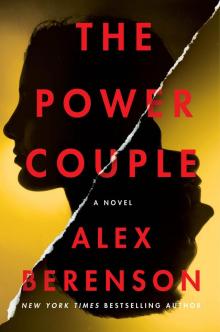 The Power Couple
The Power Couple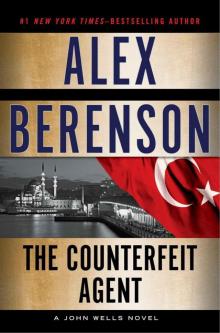 The Counterfeit Agent
The Counterfeit Agent The Midnight House
The Midnight House The Prisoner
The Prisoner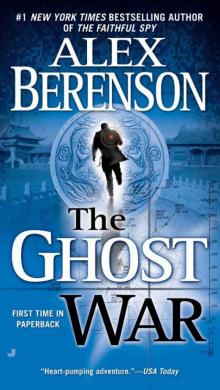 The Ghost War
The Ghost War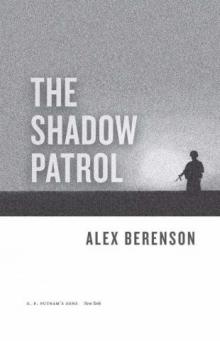 The Shadow Patrol jw-6
The Shadow Patrol jw-6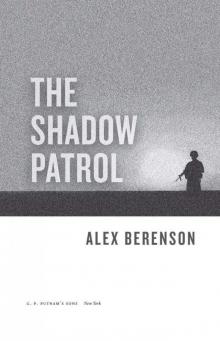 The Shadow Patrol
The Shadow Patrol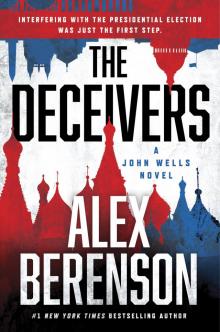 The Deceivers
The Deceivers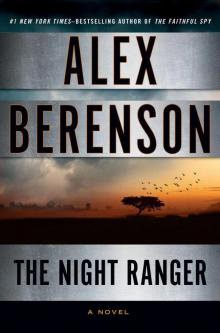 The Night Ranger jw-7
The Night Ranger jw-7 The Faithful Spy
The Faithful Spy The Prince of Beers (Kindle Single)
The Prince of Beers (Kindle Single)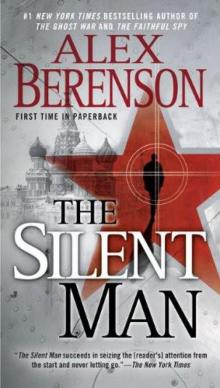 The Silent Man jw-3
The Silent Man jw-3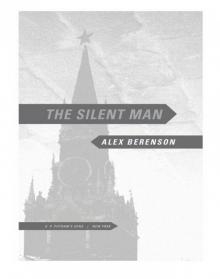 The Silent Man
The Silent Man The Wolves
The Wolves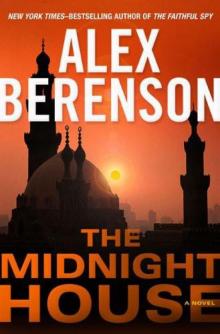 The Midnight House jw-4
The Midnight House jw-4 The Ghost Agent
The Ghost Agent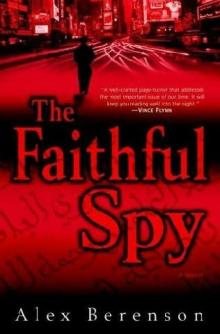 The Faithful Spy jw-1
The Faithful Spy jw-1 The Prince of Beers
The Prince of Beers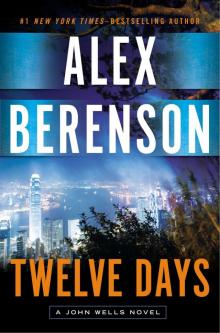 Twelve Days
Twelve Days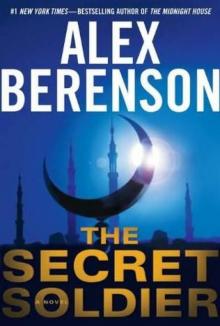 The Secret Soldier jw-5
The Secret Soldier jw-5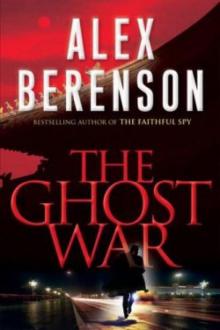 The Ghost War jw-2
The Ghost War jw-2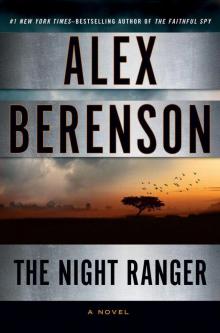 The Night Ranger
The Night Ranger